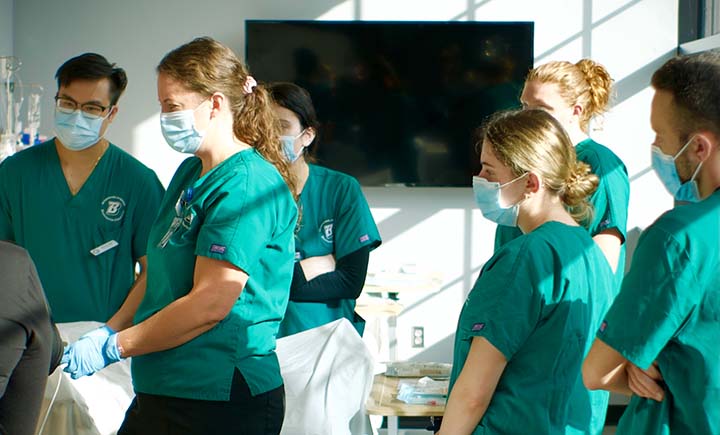Uniform loan program lets graduating students pay it forward

In spring 2021, Decker College of Nursing and Health Sciences launched a uniform loan program for undergraduate nursing students. Students graduating from the traditional and accelerated nursing programs donated used scrub tops and bottoms to the next cohort of students, saving them money, recycling the clothing and further connecting the students.
The uniform required for undergraduate clinical experiences — learning experiences in hospitals and other healthcare organizations that are integral to nursing curricula — consists of a hunter green, V-neck scrub top with the Decker College logo on the left side and black scrub bottoms or other ankle-length black pants with pockets.
It typically costs a student between $150-$250 to buy the recommended amount of uniforms needed for clinical experiences. For students struggling financially, the cost can be prohibitive.
While Decker College has never had a formal uniform loan program, informally this has been taking place for decades with senior students passing down (or selling) their used uniforms to junior class members. In the past, Decker’s Innovative Simulation and Practice Center and its Division of Advising and Academic Excellence have stored items donated by graduating seniors.
Decker faculty decided it was time for a formal program and to get the undergraduate nursing student organizations involved. The Nursing Student Association (NSA) and the Mary E. Mahoney Nursing Support Group (MEM) both supported the idea and worked with Decker’s advising staff to develop a plan.
“There is a significant financial burden that Decker students have to deal with as they approach their junior year,” said Nicole Sammartano, NSA president. “Students are expected to buy hundreds of dollars’ worth of textbooks, multiple new uniforms and all of the professional nursing equipment needed to go to clinicals. Purchasing all of this at once is very stressful, especially since most college students aren’t working jobs with particularly high wages. The uniform loan program was created to provide a form of financial relief.”
Graduating seniors and baccalaureate accelerated track (BAT) students were asked to donate their scrub tops and bottoms mid-May. Collection boxes were set up outside the NSA and MEM offices, which are located on the first floor of the Health Sciences Building (HSB), which Decker College moved into in December 2020.
“The NSA and MEM each spent one day collecting donations in their student organization offices,” said Aly Novi, academic advisor, Decker College. She added that the program was advertised to students by the Division of Advising, MEM and NSA.
Novi said donations kept coming in from students (and some alumni) after the MEM and NSA drop-off events. In total, 48 scrub tops were collected, along with a small number of scrub bottoms (many students keep the bottoms since they can be paired with whatever top is required at their place of employment following graduation).
Donations were stored in the Advising Suite, which had the uniforms cleaned prior to distributing them at the beginning of the fall 2021 semester to students expressing financial need via a uniform request form that had been shared with students over the summer.
“I was able to receive a top from the uniform loan program,” said Batur Shairzadeh, a junior in the traditional nursing program. “Being able to reduce the cost of spending towards uniforms helps provide financial flexibility to help manage my funds for the semester related to food, other academic supplies and other necessities.”
As a result of the generous number of tops received in a variety of sizes, every student who requested a scrub top received one. With few bottoms available and in limited sizes, not every student who requested bottoms was able to get them.
“This program lessens the financial burden for students, especially those with financial need,” said Alyssa Vilda ’21, who served as NSA president last year. “Going into junior year or the BAT program is really expensive, so this is a huge benefit.”
The uniform donations had an unforeseen, additional bonus: They helped students who were unable to source them as a result of supply chain issues affecting manufacturers in almost every industry across the nation.
“A lot of the junior nursing students haven’t received their scrubs yet as their orders have been processed extremely slowly by the manufacturer,” said Emily Wang, MEM president. “Through this uniform loan program, they are able to wear their scrubs in time for clinicals.”
Uniform tops are still available through Decker’s Division of Advising and Academic Excellence.
Novi said the program will continue and that students who received uniforms have been asked to return them to the Advising Suite upon graduation so they may continue benefitting future students.
